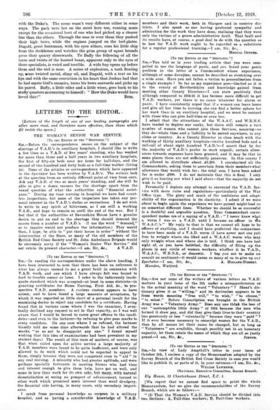[To THE EDITOR OF THE "SPECTATOR."] SIR,—You told us in
your leading article that you were com- pelled to use the language of panic, and you found your panic problem in the letter of a Commandant whose experience, although of some duration, cannot be described as stretching over a wide area. Have you not fallen a victim to generalization from a single example ? So far as my experience goes—limited as it is to the county of Hertfordshire and knowledge gained from meeting other County Directors—I can state positively that although compared to 1914-16 it has become more difficult to get V.A.D. workers, yet there is no cause whatever for alarm or panic. I have consistently urged that if a woman can leave home and give all her time to nursing she can find a better sphere for her work than in an auxiliary -hospital, and we must be content -with those who can give half-time or even less.
I admit that the attractions of the W.A.A.C. and W.R.N.S.
have tended to deplete our ranks., but there still remain a vast number of women who cannot join those Services, meaning—as they do—whole time and a liability to be moved anywhere, to any clime or Country. As a County Direetor in close -touch with the working of thirty auxiliary hospitals—twelve hundred beds and a roll-call of about eight hundred V.A.D.'s—I assert that by far the majority of V,A.D.'s prefer to work unpaid; certain allow- ances towards expenses have been granted, and it may be that in some places these are not sufficiently generous. In this county I am allowed to distribute about 41,200. I circularized all the Commandants, asking them to ascertain from their members what allowance they would wish for; the total sum I have been asked for is under .2300. I do not maintain that this is final. I only give it as bearing out what I said above—that the majority do not wish to be paid.
Personally I deplore any attempt -to surround the V.A.D. Ser-
vice with more rules and regulations—particularly of the War Office type. The glee), and much of the usefulness and adapt- ability of the organization is its elasticity. I admit if we were about to begin again the experience we have gained might lead -us on somewhat different lines. Whether we should be so successful is a doubtful and arguable question. Your Commandant corre- spondent makes use of a saying of a V.A.D. "I never knew what a worm I was as a V.A.D. until I became an officer in be W.A.A.C.'s." My reply to that is that we cannot all hope to be officers of anything, and I should have preferred the comparison to have been made of a V.A.D. worm (I have never met one yet) free to wriggle where she liked and a W.A.A.C. worm who may only wriggle when and where she is told. I think you have lost sight of, or you have belittled, the difficulty of filling up the places in any circle of woman workers, whether it be V.A.D., W.A.A.C., W.R.N.S., or domestic. I beg you not to make an assault on sentiment—it would cause so many of us to give up am.


































 Previous page
Previous page